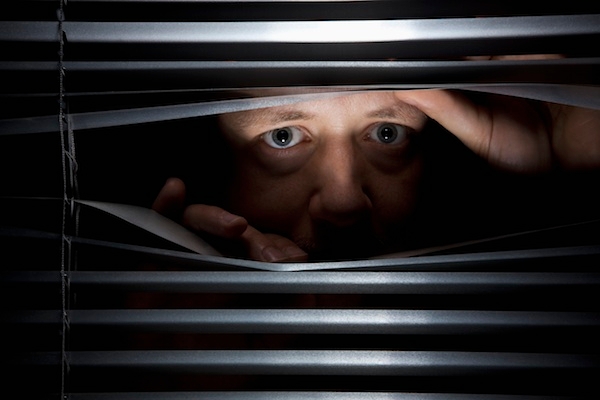You just can’t win with a conspiracy theorist. For him or her, the long-established association of conspiracy theory with paranoia goes to show that there is a secret plot to conceal the truth and discredit truth-tellers. However, as Joseph Heller put it, ‘Just because you’re paranoid doesn’t mean they aren’t after you.’ And, in any case, perhaps the sanest response to the prevailing conditions is paranoia. Look at the news. There’s the bankers, of course, conniving to rip us off. But even doctors are at it too. GlaxoSmithKline has just been fined $3 billion for convincing them to prescribe inappropriate medicine.
Yes, these are indeed high days for conspiracy theories. The internet has vastly increased information availability and awareness of the forces which govern our lives. Meanwhile, we remain storytelling mammals, programmed to make sense of what’s out there: and there is nothing so efficient as a good conspiracy theory to provide a comforting explanation of a crazy world. Mention one conspiracy theory and you will soon become acquainted with numerous others, all somehow linked: the dark dealings and money manipulation of the central banks, the unnecessary wars, the emphasis on ‘panem et circenses’ (or sport and shopping), the fluoride in water, the trails of spirit-dampening chemicals emerging from aeroplanes — it is all, apparently, geared to suppress and exploit common people and further the interests of a tiny elite.
It’s easy to get carried away. We shouldn’t forget, though, that conspiracy in some contexts is the norm. One can sanely believe that the Nazis set fire to the Reichstag in 1933.
Then again, a government might respond with such alacrity to an event that the event is assumed to have been staged in order to justify the response. The US government was enabled by the events of 11 September 2001 to act in ways that suited an established purpose (the war in Afghanistan began on 7 October 2001, the USA Patriot Act was signed into law later that month) but that does not mean, as millions fervently believe, that it was implicated in the atrocity.
The sane man puts his trust in government; or does he? When Theresa May last month branded critics of her draft communications bill (or ‘snooper’s charter’) ‘conspiracy theorists’ — ‘I have no doubt conspiracy theorists will come up with some ridiculous claims…’ — she was in tune with the US State Department’s Bureau of International Information Programs, whose website declares, ‘Conspiracy theories exist in the realm of myth, where imaginations run wild, fears trump facts, and evidence is ignored.’ The assumption in both instances is that ‘conspiracy theorist’ is a synonym for ‘fruitcake’. But that is not necessarily just, or even sensible: a conspiracy theory does not, by its very nature, ‘exist in the realm of myth’ — not these days.
Concern about the erosion of civil liberties is valid. We want to be protected from terrorists and paedophiles, of course, but must you therefore claim the right to read my post and emails? Governments are as interested in the individual human as mother nature herself: that is, not at all. It is the nation that matters. It is not crazy to be suspicious of manoeuvrings which are, after all, beyond the ken of most.
That being the case, a concerted attempt by a select group to change the world (or ‘conspiracy’) need not be secret at all. It just needs to be conducted in language, and to be concerned with concepts, like ‘quantitative easing’, which few understand. There are extremely detailed and serious-minded conspiracy theories about the collapse of the euro, which was, they say, intended to implode, designed to fail, in order to help usher in global government (an arrangement which will ultimately benefit that tiny elite). Does that seem crazy? Well, just look at what is happening before our eyes. Angela Merkel — ‘The lesson of this crisis is more Europe, not less Europe’ — is quite able to chill the blood in full view of the world’s press.
It is now completely normal, even orthodox, to be sceptical about climate change — this position entails acceptance of a conspiracy theory. Middle-aged and respectable or not, we are all at it, inquisitive, suspicious, more knowledgeable than before. We might not call ourselves conspiracy theorists but that is what many have imperceptibly become. This is a good thing, no? The powers that be must be held to account. The so-called paranoid’s question, cui bono? — who is going to benefit from this? — is a question always worth asking. Liberty is precious: trust no one.





Comments